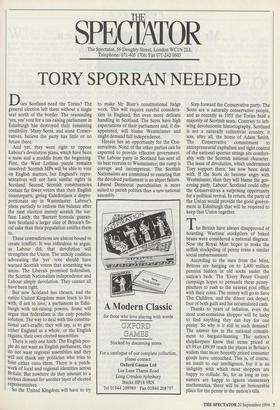SPEd E ATOR
The Spectator, 56 Doughty Street, London WC1N 2LL Telephone: 071-405 1706; Fax 071-242 0603
TORY SPORRAN NEEDED
Does Scotland need the Tories? The general election left them without a single seat north of the border. The resounding `yes, yes' vote for a tax-raising parliament in Edinburgh has destroyed their remaining credibility. Many Scots, and some Conser- vatives, believe the party has little or no future there.
And yet, they were right to oppose Labour's devolution plans, which have been a mess and a muddle from the beginning. First, the West Lothian puzzle remains unsolved: Scottish MPs will be able to vote on English matters, but England's repre- sentatives will not have similar rights in Scotland. Second, Scottish constituencies contain far fewer voters than their English counterparts, giving Caledonians a dispro- portionate say in Westminster. Labour's plans partially to redress this balance after the next election merely scratch the sur- face. Lastly, the 'Barnett formula' guaran- tees Scotland a larger slice of Britain's fis- cal cake than their population entitles them to.
These contradictions are almost bound to create conflict. It was ridiculous to argue, as Labour did, that devolution will strengthen the Union. The unholy coalition advocating the 'yes' vote should have warned Scottish voters that something was amiss. The Liberals promised federalism, the Scottish Nationalists independence and Labour simply devolution. They cannot all have been right.
But now Scotland has chosen, and the entire United Kingdom must learn to live with, if not to love, a parliament in Edin- burgh with tax-raising powers. Some will argue that federalism is the only possible solution. The way to deal with this constitu- tional cat's-cradle, they will say, is to give either England as a whole, or the English regions, their own elected assemblies.
There is only one hitch. The English peo- ple do not want an English parliament, they do not want regional assemblies and they will not thank any politician who tries to foist either onto them. There is a patch- work of local and regional identities across Britain. But nowhere do they amount to a serious demand for another layer of elected representatives.
So the United Kingdom will have to try to make Mr Blair's constitutional fudge work. This will require careful considera- tion in England, but even more delicate handling in Scotland. The Scots have high expectations of their parliament and, if dis- appointed, will blame Westminster and might demand full independence.
Herein lies an opportunity for the Con- servatives. None of the other parties can be expected to provide effective government. The Labour party in Scotland has sent all its best recruits to Westminster; the rump is corrupt and incompetent. The Scottish Nationalists are committed to ensuring that the devolved parliament is an abject failure. Liberal Democrat parochialism is more suited to parish politics than a new national assembly. Step forward the Conservative party. The Scots are a naturally conservative people, and as recently as 1955 the Tories held a majority of Scottish seats. Contrary to left- wing devolutionist historiography, Scotland is not a naturally collectivist country; it was, after all, the home of Adam Smith. The Conservative commitment to entrepreneurial capitalism and tight control of the national sporran strings sits comfort- ably with the Scottish national character. The issue of devolution, which undermined Tory support there, has now been dealt with. If the Scots do become angry with Westminster, then they will blame the gov- erning party, Labour. Scotland could offer the Conservatives a surprising opportunity for a political revival. In return, the party of the Union would provide the good govern- ment in Edinburgh that will be required to keep that Union together.
The British have always disapproved of hoarding. Wartime stockpilers of baked beans were considered a national disgrace. Now the Royal Mint hopes to make the selfish stockpiling of penny coins a similar social embarrassment.
According to the men from the Mint, Britons are hanging on to 2,400 million pennies hidden in old socks under the nation's beds. The 'Every Penny Counts' campaign hopes to persuade these penny- pinchers to rush to the nearest post office with their coins. The money will go to Save The Children, and the donor can depart, free of both guilt and his accumulated cash.
Thanks to years of inflation, even the most cost-conscious shopper will be lucky to find anything they can buy for one penny. So why is it still in such demand? The answer lies in the national commit- ment to bargain-hunting. The nation's shopkeepers know that items priced at £9.99 or £99.99 reach the places in Britain's wallets that more honestly priced consumer goods leave untouched. This is, of course, an insult to our intelligence, but it is an indignity with which most shoppers are happy to collude. So, for as long as con- sumers are happy to ignore elementary mathematics, there will be an honourable place for the penny in the nation's tills.


































































 Previous page
Previous page